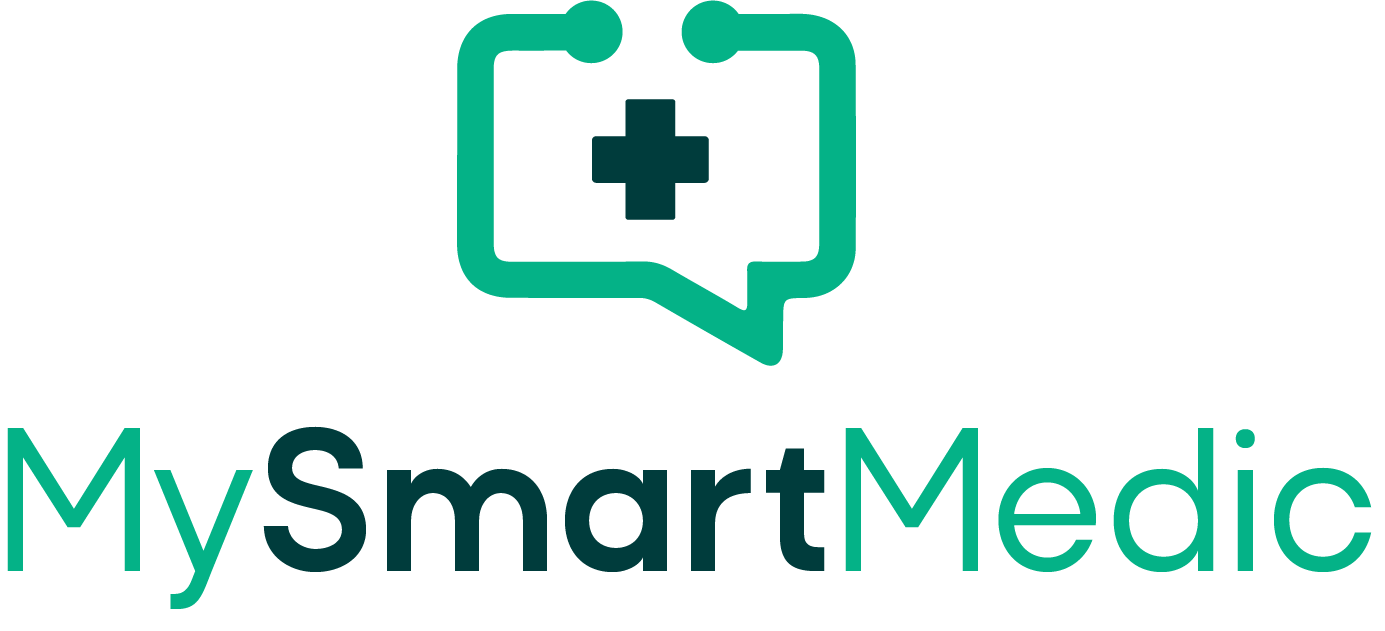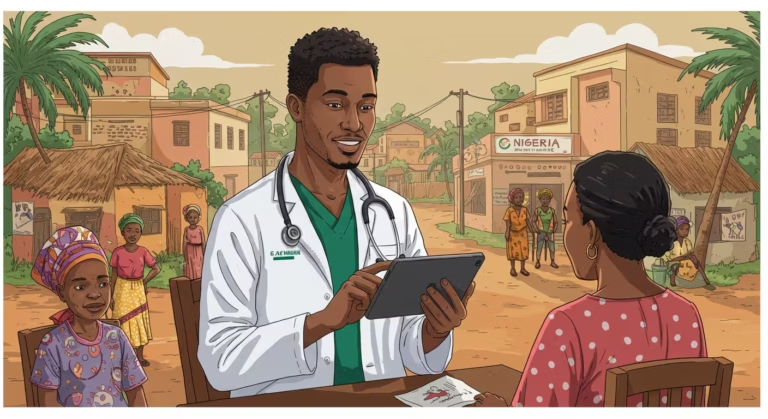Telemedicine in Nigeria: Complete 2025 Guide
The outbreak of Covid-19 pandemic and its restrictions is the turning point in the wide acceptance of telemedicine in Nigeria.
But, why should you stand for long hours in queues or travel long distances to access healthcare when you can receive the same care from the warmth of your home?
With telemedicine, you no longer need to visit a hospital before you access a doctor and receive healthcare services.
Telemedicine utilizes different technologies to bring clinics closer to people who are far away. Before we proceed, here is what you need to know about telemedicine meaning.
Meaning of Telemedicine?
Telemedicine is the application of information and telecommunication technology to improve healthcare services bridging distance barriers.
It includes the use of text, audio, and video to provide health solutions when a patient cannot meet with the doctor physically.
From discussing symptoms, consulting to performing surgery, the healthcare sector has advanced to meet medical needs remotely.
Using real time diagnostics, a patient can interact and get a prescription from the doctor through telephone and video calls.
Whether you are living in the city or a remote area, the medical landscape of digital healthcare Nigeria offers you unlimited access to quality healthcare through Telemedicine.
According to the World Health Organization report 2021, malaria is among the top causes of death in Nigeria. In fact, a greater number of males and females have died due to malaria parasites.
For such a common health concern, Telemedicine cannot prevent total death from malaria, but it can make a remarkable difference.
Instead of patients leaving their houses in distress early hours of the morning to book an appointment to see a doctor, they can speak with a doctor while resting at home.
That sounds great, right? With the latest advancement, telemedicine has evolved from consulting with a doctor to a physically absent specialist performing surgery using a Robot.
Types of Telemedicine Services Available in Nigeria
Medical innovations happening around the world in the area of telemedicine are gradually gaining ground in Nigeria.
When you or your loved ones are feeling unwell, the different telemedicine services are valid and safe ways to seek medical attention and delivery.
You need the right information to seek and access online doctor consultation in Nigeria. Some hospitals or healthcare startups offer specific telehealth services.
Therefore, before setting out for digital healthcare, arm yourself with the necessary information about the different telemedicine services available in Nigeria.
With this, let’s dive into the types of telemedicine services that are available in Nigeria. This include
- Real Time interactive / synchronous services
- Store-and-forward / asynchronous
- Remote monitoring
Telemedicine in Nigeria is primarily based on the real-time interactive service involving video consultation between the patient and the health practitioner.
1) Real Time interactive / Synchronous services
One of the commonest telehealth Nigeria modes of service is the real time interactive service. The medical professional meets patients face to face using video conferencing tools.
A major application of telemedicine in Nigeria is in Telepsychiatry. With the surge in mental health problems in the society, healthcare professionals apply real time interaction to provide telepsychiatry mental health care to patients remotely.
Other real time applications of interactive synchronous services in healthcare delivery are in
- Consultation
- Medical history data collection
- Follow-up to doctor’s appointment.
2) Store-and-Forward / Asynchronous
The collection and storage of data happens ahead using the Store-and-Forward Telehealth (SFT) service. The healthcare facility reviews the patient information at a later time is an important feature of this telemedicine service. The following are some of the SFT services
- Review of laboratory results
- Review of x-rays
- Review of diabetic retinopathy
3) Remote monitoring
In remote monitoring, the healthcare provider uses available technologies to track the performance of a patient who may be in a critical state.
Some medical technologies monitor vital signs, check symptoms, detect abnormalities, analyze medical data, and record disease retardation.
Examples of telehealth remote monitoring technology are
- Patch biosensors for temperature and heart rate check and fall detection
- Electrocardiogram for heart beat and detecting heart attack
- Pulse Oximeters for chronic lung or heart conditions
Why Telemedicine? Top 5 Benefits in Nigeria
Receiving prompt access to quality healthcare through Telemedicine can save lives daily in Nigeria while offering other numerous health benefits.
Here are the top 5 benefits of utilizing telemedicine services.
1) Reduced Expenses and Travel Costs
The removal of fuel subsidies in Nigeria has increased the cost of transportation significantly.
Notwithstanding, the use of telemedicine apps in Nigeria like My SmartMedic along reduces frequent hospital visits.
Fortunately, individuals living far from a healthcare facility who initially delayed hospital visits due to unaffordable travel costs can now access a doctor virtually.
It is a win-win situation that contributes to the Sustainable Development Goal of promoting good health and wellbeing.
Patients can use medical apps like My SmartMedic app to consult a doctor, track and follow up the next doctor’s appointment.
2) Improved Healthcare Access With Better Outcomes
In public hospitals in Nigeria, there is always a long queue of patients waiting to see a doctor. In some cases, government hospitals have a maximum number of patients they attend each day considering the number of doctors available.
However, wide implementation of telemedicine in Nigeria saves the amount of time a doctor spends with a patient. It streamlines processes and cuts bottlenecks in government health facilities.
Therefore, telemedicine breaks the barrier hindering access to quality healthcare across different categories of people including the older ones.
Due to streamlined processes and excellent time management, medical practitioners experience a healthy work life balance.
3) Improved Monitoring and Better Management of Diseases
Medical innovations are altering the conventional approach to patient care and disease management.
Telemedicine allows for better handling and patient care delivery without one stepping into the hospital.
Medical trackers and other health monitoring tools collect data from patients when they are home.
Biosensors, wearable monitor for blood pressure and glucose trackers for data collection and monitoring track important indicators and proffer the suitable treatment.
Telemedicine monitors and manages health conditions associated with skin problems, depression, oxygen levels, allergies, diabetes, heart rate, and blood pressure.
Instead of continuous hospital visits for monitoring and consultation, patients utilize telemedicine for active remote monitoring.
Living in an environment with little or no specialists, telemedicine connects and keeps you in contact with specialist services and consultations for improved disease management.
Receiving health care service conveniently makes telemedicine distinct from in-person health care delivery. No travel hassle and financial pressure to receive robust healthcare services.
4) Prevention of the Spread of Infectious Diseases
In the face of COVID 19, the world stood still. Most in-person visits to the hospital and other public gatherings were put on hold. There were restrictions and bans as a way to control the pandemic.
Businesses, churches, schools, and hospitals adjusted to using virtual means in delivering their products and services. This measure minimized the spread of Covid-19 and increased the practice of telemedicine.
As an alternative mode of treatment, telemedicine controls disease outbreak while ensuring that infected persons are managed effectively.
Furthermore telemedicine prevents patients who are ill with compromised immune systems from visiting the hospital.
As such, avoids the escalation of ill persons while protecting them from germs and other infectious diseases. Also, health care providers are not at risk of contracting infection.
In addition, using the store and forward Telemedicine service, medical professionals physically isolate patients with suspected cases of infectious diseases while screening and testing referrals are ongoing simultaneously.
Also, telehealth enables patients to undergo pre-screening prior to their next appointment.
5) Unparalleled Access to Healthcare Support Without Stigmatization
Stigmatization robs patients of their voice to seek and ask for health support in the face of a challenge.
Oftentimes patients who suffer from certain debilitating diseases like HIV/AIDS face stigma from the society at large. Applying technology in medicine provides privacy to such patients.
Telemedicine promotes diversity and inclusion where stigmatized patients receive medical care without anxiety and fear. It reduces stigma and provides support and convenience to navigate such a challenging time.
Alongside the elemedicine, other intervention steps like public enlightenment and government policies programs will help curtail public, institutional and self stigma.
This means that individuals will be comfortable to talk about some difficult or unpronounced health challenges to receive proper tech medicare and support.
Many patients struggling with mental health issues do not want to be perceived as being mentally deranged. Hence, they avoid in-person hospital visits to seek medical help and support.
Therefore, telemedicine has become a paramount tool in reaching out and supporting patients with mental health challenges which will reduce suicide attempts and rates.
Telemedicine in Nigeria: Legal & Practical Landscape
Since telemedicine encompasses the use of technology to access healthcare remotely, maintaining ethical and legal standards is non-negotiable.
Some of the devices, tools and technologies in Telemedicine are remote diagnostics tools, wearable technologies, smart phones, and virtual video-based platforms and applications. Moreso, using these tech products has its implications.
The current application of the internet in delivering healthcare services poses significant challenges in areas of privacy, safety, security, and confidentiality.
As such, telemedicine requires a unique regulatory standard and framework to ensure secure data transmission, standard practice and safety of the virtual patient.
The ministry of health understands that addressing these issues can enhance the wide adoption and practice of telemedicine in Nigeria.
Therefore, the Medical and Dental Professional Acts and Codes of Medical Ethics provides a clear guideline on the practice of Telemedicine in Nigeria.
These medical bodies provide licensing details of medical professionals, set up disciplinary measures for misconduct and verifies the registration status of specialists.
Other regulatory frameworks that protect the practice of telemedicine are the Nigerian constitution and the Nigeria Data Protection Acts.
Nigeria is facing a critical challenge in integrating telemedicine in routine care hospital services.
Low internet connectivity and unsteady electricity are some of the impediments to the implementation of telemedicine in some parts of Nigeria.
Step-by-Step: How to Use Telemedicine in Nigeria
To combat poor healthcare in Nigeria, there is a need to create access to quality and affordable healthcare systems through telemedicine platforms like MySmartMedic.
Unlike other platforms, MySmartMedic App provides medical expert insights with AI integration on the application to provide accessible and affordable healthcare to Nigerians.
All you need to do is to visit MySmartMedic web app, signup and register on the platform.
Here is a step-by-step guide on how to use MySmartMedic app
- Download MySmartMedic app
- Register with NIN/phone number
- Choose a specialist (price range: ₦1,000 and more)
- During the consultation:
- Prepare medical history/docs
- Use video/audio/chat based on internet strength.
- Aftercare:
Other telemedicine apps in Nigeria are My Medicare, Heala, and Rigour Plus.
Limitations & Safety Considerations
Like every technology innovation, applying technology in health has its limitations alongside other safety considerations.
Tackling the safety issues in telemedicine is fundamental in ensuring its effective and safe application.
Technical challenges are a critical factor that limits the application of telemedicine in a developing country like Nigeria.
Since telemedicine links individuals in distant locations with medical professionals, power outage and low internet connectivity will adversely affect communication between both parties.
Safety issues can arise from poor documentation of medical history due to poor communication. Diagnostic error can result from consistent dependence on the patients or their loved ones to take vital signs.
In the case of absence of physical examination of an affected private body part, there can be diagnostic errors and limitations in offering adequate healthcare.
Future of Telemedicine in Nigeria
Since innovative technology is the backbone of today’s world, telemedicine has great potential to transform the Nigerian healthcare sector.
Most especially, bridging the gap of both urban and rural dwellers in accessing quality healthcare.
Telemedicine is the future of medical care in Nigeria. But, is this obtainable? Yes!
With the right strategy, awareness and laws to maintain the safety and data security of the patients and healthcare providers utilizing telemedicine.
FAQs About Telemedicine in Nigeria
Q: Is telemedicine legal in Nigeria?
A: Yes, regulated by the Medical and Dental Council of Nigeria (MDCN) and National Information Technology Development Agency (NITDA).
Q: Can I get prescriptions via telemedicine?
A: Yes, e-prescriptions are valid nationwide.
Q: Which health issues suit telemedicine?
A: Mental health, prescriptions, follow-ups, dermatology (photo-based).
Conclusion on Telemedicine meaning
Telemedicine meaning emcompasses healthcare delivery without visiting the health facility. It intersects between receiving remote medical services and accessibility to healthcare.
MySmartMedic is the future of telemedicine in Nigeria and Africa.
